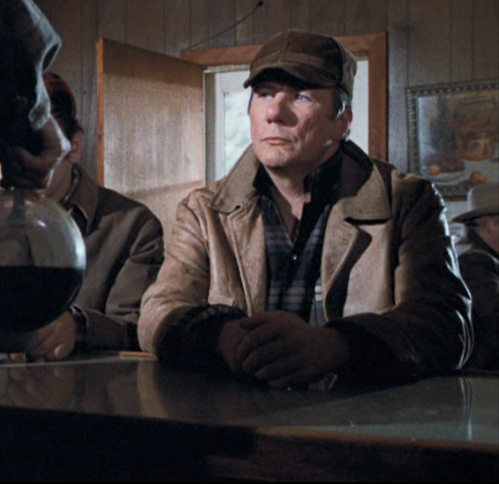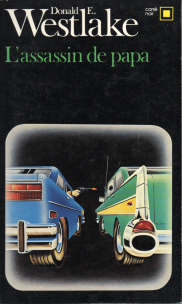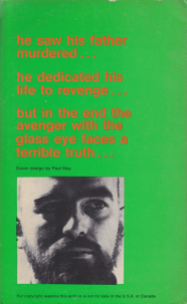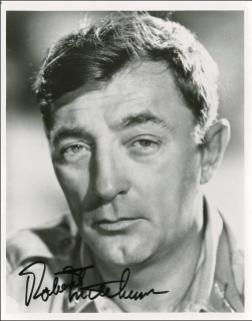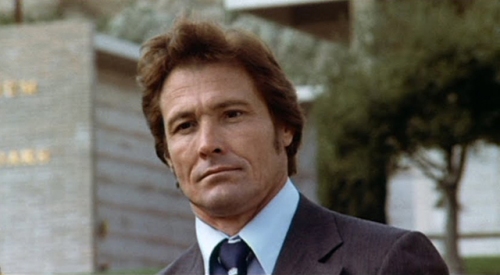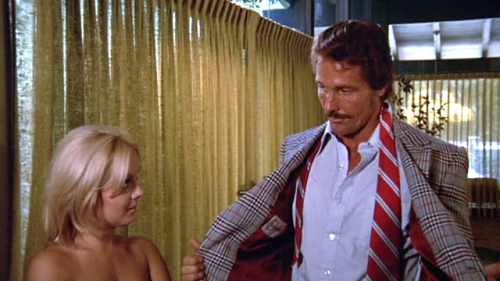So, a minute later, when May reappeared, unencumbered except for three beer cans that she distributed, Dortmunder said, “I got a very strange proposition today.”
She didn’t quite know how to take that word. Settling into her chair, she said, “A proposition?”
“A job, kind of. But weird.”
“John’s gonna describe it to you now,” Kelp said, and looked at Dortmunder, as alert as a sparrow on a branch.
Dortmunder took a breath. “It’s reality TV,” he said, and went on to describe how Murch’s Mom had introduced Doug Fairkeep into their lives and what Doug Fairkeep had proposed, including the payoff.
Somehow, every time he told that story he got the same kind of dead-air silent reaction. Now May and Kelp both gave him the glassy-eye treatment, so he said, “That’s the story, May, that’s all there is.”
She said, “Except the next day, when they drag you all off to jail.”
“Doug Fairkeep says we’ll work around that.”
“How?”
“He doesn’t say.”
May squinted, much the way she used to squint back when she chain-smoked. “I’ll tell you another question,” she said. “What is it you’re supposed to steal?”
“We didn’t go into that.”
“It might make a difference,” she said.
Dortmunder didn’t get it. “How?”
“Well,” she said, “if they were going for laughs, like. Like if you hijacked a diaper service truck, something like that.”
Kelp said, “I’m not gonna hijack any diaper service truck.”
“Like that,” she said.
Dortmunder said, “May, I don’t think so. What they do is, they find people got some sort of interesting lifestyle or background or something, and they film the people doing what they do, and then they shape it, to make it entertainment. I don’t think they’re goin for jokes, I think they’re goin for real.”
“Jail is real,” she said.
Dortmunder nodded, but said, “The problem is, so is twenty G.”
“Looks to me,” Kelp said, “as though you oughta go back and see this guy and ask him a lot more questions.”
“I’m realizing that,” Dortmunder admitted. “You wanna come along?”
“Oh, I don’t think so,” Kelp said, as casual as an aluminum siding salesman. “No need for me to poke my face in at this point. Murch’s Mom didn’t rat me out to the guy.”
“No, she didn’t,” Dortmunder said.
“But I tell you what I’ll do,” Kelp said. “Come home with me and I’ll Google him.”
Dortmunder frowned. “Is that a good thing?”
“Oh, yeah,” Kelp said.
It’s 2009. Almost half a century after you wandered into a drugstore, and found The Mercenaries. Hard to believe. Time flies when you’re having fun. You need something to read, so you surf on over to Amazon. Hey, there’s a new Dortmunder out! A few clicks later, you’ve got it on your device. No more gaudy paperbacks at newsstands, no more revolving racks at drugstores, damned few bookstores of any kind in New York now. (The rent is too damn high.) Progress. One supposes.
As always, Dortmunder dissents. But the world keeps changing, and there’s nothing anyone can do about it. As inevitable as death and taxes. Well, as the former. Apparently some people aren’t going to pay taxes anymore. More for the rest of us, huh?
Somewhere, Donald E. Westlake is rolling his eyes at us. But not on this mortal plane. Mr. Westlake has left the building, after making one last statement about identity–and how we keep confusing it. He’s been here with Dortmunder & Co. before, decades earlier.
In Jimmy The Kid, he was talking about the increasingly blurry line between fiction and reality. Real criminals getting a plan from a paperback crime novel, only to learn that real life is more complex, more contingent, and nobody knows their lines, heeds their cues. Because everybody in this world is living out his or her own story, as the protagonist, you can’t control life the way a writer can control a narrative.
In Get Real, he’s talking about the increasingly nonexistent line between fiction and ‘reality.’ As in reality TV. Semi-scripted documentaries, where people narrate their daily existence, improvise dialogue in place of having conversations–become fictional characters in their own lives.
That erudite Irishman, Bishop Berkeley, once opined that to be is to be perceived. That the world around us is created by the act of viewing it, God being the divine perceiver who holds the fabric of reality together. I don’t know about all that, but we 21st century humans sure behave as if the Bishop spoke gospel. Only for us, God is a camera. And a boom mike. Budget lacking, a webcam, or smartphone. Life must be dramatized. Like it wasn’t dramatic enough already.
Let’s learn about this one. The last one. Not just the last Dortmunder. The last book in our queue. (If there are any outstanding wagers, with regards to my reaching this milestone, time to settle up).
Given how much earlier Dirty Money appeared, we should probably assume this is the very last piece of work Westlake submitted for publication in his lifetime. Marilyn Stasio’s review for the New York Times came out in late August of 2009, eight months after Westlake departed this mortal coil by way of Mexico. After a long series of affectionate thumbnails, she put more time and effort into this one, as a final homage, even praising the wry social commentary that was always a part of this series.
It’s quite a nice review, one of the best he ever got in the Times, which routinely gave short shrift to far better Westlakes than this. His humorous writings in particular tended to be dismissed as enjoyable diversions, but now his satiric edge begins to be appreciated. All he had to do was die. (Why am I thinking of Daffy Duck again? Oh right.)
(Censored!? Is literally nothing sacred? Oh never mind. Overture. Curtain lights. On with the show, this is it.)
The quote up top gives us the premise. One fine day in New York City traffic, Murch’s Mom struck up a conversation with her fare of the moment, a TV producer working for Get Real, a shingle devoted to reality shows, owned by a media company called Monopole, majority controlled by by Trans-Global Universal Industries, the same mega-corporation referenced in What’s The Worst That Could Happen? (No mention of its disgraced CEO, so maybe he’s in prison. Or the White House. Details.) TUI in turn is controlled by Somnitech, which we heard about in The Road to Ruin. It is, quite literally, a rich tapestry.
Right now, the only show they’ve got on the air is The Stand, which is not, you should know, about a post-apocalyptic world in which the fate of humanity shall be decided by a war between Boulder and Las Vegas. It’s about a failing roadside farm stand in upstate New York. The kind of thing you come across channel-surfing, and you wonder what the hell is keeping Captain Trips. Should have been here decades ago.
You know how proud mothers can never resist talking about what their sons do for a living. So when our Gladys summons both Murch and Dortmunder to her cab for a confab, she has worrisome news to impart.
Stan said, “Hello? You started telling him what about me?”
“I’m looking to see,” his mother told him, “could he get you a job.”
“In TV? What am I gonna do, sports?”
“Whatever,” his mother said. “Face it, Stanley, your previous occupation is coming to an end.”
Stan frowned at her profile. “How do you work that out?”
“Cameras,” his Mom said, and pointed at one mounted on a nearby pole. “Security. ID. Tracking. Records of everything. Global positioning. Radio chips. It’s harder for people like you and John every day, and you know it is. It is time, Stanley, you underwent a career change.”
Dortmunder said, “It isn’t that bad.”
“Oh, it’s all right for you,” she told him. “You go on doing what you’re doing because what else have you got, but Stanley’s possessed of an actual marketable skill.”
“Mp,” said Dortmunder.
Stan said, “Which skill is that?” “Driving,” she said. “Keeping your wits about you. Anyway, the point is, I liked this guy, Doug Fairkeep his name is, so I wound up I gave him a little more of your background than I originally planned.”
Fairkeep wasn’t looking for any new drivers, but when he realized he was talking to somebody who could put him in touch with professional heisters, he got very excited. He immediately saw the potential for a new show. Title to be determined (I’d stick with the King motif–Misery—Needful Things–I think he just had a book out called Finders Keepers?)
She gives Stan the guy’s card and it looks legit. What he and Dortmunder do isn’t, so how could they ever pull a job on national TV and not end up in a reality show about prison, perhaps on MSNBC? (With Dortmunder’s luck, it’d be Animal Planet, and he’d be a teaching aide for German Shepherds who chase burglars. Rrrrr!)
While they ponder that, Chapter 2 introduces us to Mr. Fairkeep, and his production assistant, Marcy Waldorf. Who would like to be called a writer, since that’s what she’s doing for her meager living, but alas–
“It is not writing, Marcy,” Doug said, “for two reasons. In the first place, The Stand is a reality show, the cameras catching real life on the fly, not a scripted show with actors. The Finches aren’t actors, Marcy, they are an actual family struggling to run an actual farmstand on an actual farm on an actual secondary road in upstate New York.”
“But,” Marcy objected, “they’re saying the words we write, down here in the production assistants’ room, Josh and Edna and me.”
“The Finches often,” Doug allowed, “follow our suggestions, that’s true. But, Marcy, even if they followed your suggestions one hundred percent of the time, you still wouldn’t be a writer.”
“Why not?”
“Because The Stand is a reality show, and reality shows do not have actors and writers because they do not need actors and writers. We are a very low-budget show because we do not need actors and writers. If you were a writer, Marcy, you would have to be in the union, and you would cost us a whole lot more because of health insurance and a pension plan, which would make you too expensive for our budget, and we would very reluctantly have to let you go and replace you with another twenty-two-year-old fresh out of college. You’re young and healthy. You don’t want all those encumbrances, health insurance and pension plans.”
(Perish the thought. And quite possibly the bodies producing said thoughts, but that’s a whole other issue, currently in the capable hands of the former CEO of TUI. We just had to know what was the worst that could happen.)
Doug is delighted to learn that he’s got a call from the son of that Murch woman–now he can get to work on the new show (working title The Gang’s All Here, there goes the motif). He’s even more pleased to learn that he’s going to meet Dortmunder as well–the criminal mastermind. (Hey, he is sometimes!)
He’s a bit nonplussed to learn he’s going to meet them across the street from his office on Third, at the outdoor cafe pertaining to a bar/restaurant named Trader Thoreau. (We are spared a description of the thematically decorated walls inside, since they never go inside).
The meeting is short, not at all sweet, and mainly involves Fairkeep trying to get pictures and tape recordings of our heroes, while they make very sure he gets no such thing to hold over their heads. And then politely suggest that they might throw him under a slow-moving bus if he keeps trying. No shortage of those on Third.
The main thing is the offer, and it’s tempting. 20g per man, plus six hundred a day in working expenses. The storyline, to unfold over one season, is them finding a place to rob, planning the job, then pulling it. And the sticking point is how they can legally commit an illegal act on national TV.
(There is a poignant moment where Marcy, tasked with taking surreptitious photos of the duo with her smartphone only to have it confiscated, makes a plaintive request for its return, saying her entire life is on that phone. Stan deletes the photos, hands it back. Chivalry is not dead. Certain other things, perhaps….)
Kelp is brought in to consult, and he brings in The Ultimate Consultant, as you see up top. Doug consults on his end with his boss, Babe Tuck, a former foreign news correspondent, who has seen it all before, or so he thought. Just a preliminary consult, they’re not ready to commit to the concept yet, and even Babe, who has been held hostage by terrorists, is somewhat taken aback at the threat of bus-related violence on Third Avenue.
“I didn’t take it literally,” Doug assured him. “I took it to be Stan telling me he would do what it took, so he was showing me the extreme case. Naturally, I gave him the recorder before we got anywhere near there.”
“So there’s a threat of violence,” Babe said, “without the actual violence. That’s good, I like that.”
“These guys,” Doug said, “have a certain grungy kind of authenticity about them that’ll play very well on the small screen.”
Nodding, looking at his notepad, sucking a bit on his lower lip, Babe said, “What are they gonna steal?”
“That’s up to them,” Doug said. “We didn’t get that far.”
“No widow’s mites,” Babe cautioned. “No crippled newsie’s crutches.”
“Oh, nothing like that,” Doug said. “Our demographic would like to see some snooty rich people get cleaned out.”
(For all we know, many similar conversations have taken place at production offices with regards to many a Dortmunder movie that did or did not happen, as well as the TV pilot threatened in the trades a short while ago, of which nothing has been heard since. Marcy should try applying for a job on one of those, they have writers. Kind of.)
Doug gets a call from Dortmunder. He and Kelp are waiting to see him. In his apartment. (Kelp must have decided this was too interesting a meet to pass up, Post-Google). They tell him to bring a sixpack. Heineken, please. It was Beck’s at Trader Thoreau, so I’m guessing the beer choice is Andy’s. (Nobody ever has DAB in stock these days. My dad used to like that.)
And the moral here is that Google is a very good thing indeed–when you are the Googler. As opposed to the Googled. Googlee? Whatever.
Doug is having mixed emotions about these people. On the one hand, they’re breaking into his place like it’s no big deal, making themselves at home, pawing through his personal effects, learning about him while they wait (Like Google in three dimensions. With lockpicks.) On the other hand, this does prove they’re–you know–for real. That’s what he wanted, right? Reality. Of course, for people in his business, the meaning of the word is more flexible
Let’s say we rent a house, and we furnish it,” Fairkeep said, “and we put spycams all through the house, and we get a bunch of college kids, boys and girls, and we pay them to live in the house. But the gimmick could be, they have to spend the whole summer vacation there, they can’t ever step outside the house. Anybody leaves the house, they’re out of the game. We ship in food, and they can watch TV, and like that. And they don’t know each other before they start. And we can make up any rules we want to make up, make it different from any other show like that.”
Dortmunder said, “And you get people to do this? All summer?”
“We’ve got waiting lists,” Fairkeep said.
Dortmunder nodded. “And people watch this.”
“You’d be surprised.”
“I am surprised.”
“The point being,” Fairkeep said, “in a situation like that, what’s gonna happen? Who falls in love, has a fight, can’t hack it. We do the setup, but then they just do themselves. Same with you.”
Andy said, “Only, where’s our setup?”
Which in Kelp-speak means “What do we steal?” This remains the sticking point. And the logical solution would be that they’d steal from Get Real, or one of its sister companies–a sanctioned theft, indemnified under the corporate umbrella. Doug doesn’t like this logic, but he has no convincing counter to it. If Dortmunder & Co. can’t commit legal larceny, the show will not go on.
Doug protests that Get Real doesn’t have anything worth stealing–the other companies have things like aircraft engines that make for an impractical heist. Having done his Googling well, Kelp knows how rich the corporate tapestry is, rattles off a list of names, knocking Doug even further off-balance.
Dortmunder, focusing on the essentials, insists that somewhere in this capitalist crochet there must exist some cash. Hearing this assertion, Doug Fairkeep hesitates for a nanosecond, then issues a rote denial. It’s all electronic impulses now, no cash anywhere (this in spite of the fact that he’s already told them he pays restaurant checks in cash so he can skim his expense account).
The thieves spot this wobble like a shark smells blood in the water. So. There’s cash. And it has to be somewhere Doug could have seen it. The game’s afoot!
Next, we are with young Judson Blint, still slaving away at the enviable behest of the enticing J.C. Taylor, keeping her minor fraudulent operations afloat, while she busies herself with the great nation of Maylohda she conjured out of thin air to scam the entire planet. She tells him to go have some fun. He says yes ma’am. She does not like that.
“Ma’am,” she said, with a scornful look, and left. Judson shrugged—it was so hard to know the right reactions to people when you were barely a person yourself at nineteen—and went back to, face it, work.
He always saved the music business for last, because those people were the most fun. The people who just wanted to be a detective at home in their spare time or just wanted to look at dirty pictures at home in their spare time were pretty cut-and-dried, merely sending in their money, but the people who sent music to Super Star Music to have lyrics set to it, or alternatively, lyrics for an infusion of music (sometimes A’s request meshing just fine with B’s, so what came in could be shipped right back out again, neither participant any the wiser), tended to write confessional letters of such mawkish cluelessness that Judson wished there were, somewhere in the world, a publisher gutsy enough to put out a collection of them.
But that was not to be, since dispassionate self-knowledge is not a quality held in much esteem by the majority of the human race, so not enough people would find the product funny. Oh, well; at least he could enjoy the sincerity of these simpletons, to ease his own stress in the workaday world.
Ah; this grandmother of eight had been compelled at last to her true vocation as love-song lyricist by the flaming car-crash death of her favorite seventeen-year-old grand-daughter. Well, Grandma, lucky for you she bought it.
He’s only delighted when Dortmunder calls, saying something about getting the group back together. To play a very different kind of song.
And for the penultimate time in the annals of world literature–stop booing, it’s not my fault!–
When Dortmunder walked into the OJ Bar & Grill on Amsterdam Avenue that Wednesday night at ten, the big low-ceilinged square room was underutilized. The booths along both sides and the tables in the middle were all empty. At the bar, along the rear of the room, Rollo the meaty bartender, off to the right, was slowly carving tomorrow’s specials onto a black blackboard with a stub of white chalk, a gray rag in his other hand. The regulars, as usual, were clustered along the left side of the bar.
It being April, the regulars were discussing taxes. “I might declare my bowling ball as an expense,” one said.
The guy to his right reared back. “Your bowling ball!”
“We wager certain amounts,” the first regular explained. “Only then I’d have to declare how much I won, and then pay tax on that. I asked the guy at the drugstore, which way do I come out ahead, he said he’d get back to me on that.”
As Dortmunder angled toward Rollo, he saw that the barman was groping in the direction of “lasagna,” but hadn’t quite reached it yet. Seeing Dortmunder, he nodded and said, “Long time no see.”
“I been semiretired,” Dortmunder told him. “Not on purpose.”
“That can be a drag.” Rollo pointed his jaw at the black-board. “Whadaya think?”
Dortmunder looked: LUHZANYA. “I don’t know about that H,” he said.
(I don’t know I’d necessarily want to eat lasagna at the OJ, no matter how it’s spelled, but if that was the price of attendance, gladly would I pay it. That’s what they invented Bismuth Subsalicylate for. )
Dortmunder and the next-to-arrive Kelp proceed to the back room, as one of the regulars insists that the flat tax means you owe the Feds the equivalent of one month’s rent. Past the pointers and setters, past where the phone booth used to be when there were still phone booths. They take a seat, pour themselves some Amsterdam Liquor Store bourbon (Our Own Brand), and wait.
Not for long. Thunderous footfalls sound in the distance, like you hear at the opening of a Kaiju Eiga film. Want to see how you spell Tiny Bulcher in Japanese?
As Dortmunder nodded, the doorway filled with enough person to choke Jonah’s whale. This creature, who was known only to those who felt safe in considering him their friend as Tiny, had the body of a top-of-the-line SUV, in jacket and pants of a neutral gray that made him look like an oncoming low, atop which was a head that didn’t make you think of Easter Island so much as Halloween Island. In his left fist he carried a glass of what looked like, but was not, cherry soda. When he spoke it wasn’t a surprise that bass notes of an organ sounded: “I’m late.”
Judson arrives, and behold–he’s got his own drink. From now on, Rollo the Bartender will refer to him in absentia as the Campari and Soda, we may safely infer.
So everybody gets into the loop with the Get Real thing, and the meeting at Fairkeep’s apartment, and the momentary wobble when they asked if he knew of a place that had cash. Incidentally–
Dortmunder said, “Andy and I had a discussion with the guy this afternoon, at his apartment.”
Stan said, “Oh? Where’s that?”
“One of those Trump buildings on the west side.”
“And how is it?”
Dortmunder shrugged. “Okay.”
“A little too bronze,” Kelp said.
Tiny said, “Over here, I’m still working around this.”
“Okay,” Dortmunder said.
“Andy did some computer trick—”
“It’s no trick,” Kelp said. “I Googled.”
“Oh, sure,” Stan said.
“Whatever,” Dortmunder said. “Turns out, this guy’s little company is owned by a bigger company, owned by a bigger company, and like that. Like those cartoons where every fish is getting eat by the bigger fish behind him.”
So Trump now officially exists in the Dortmunderian universe. As if they didn’t have enough problems there. But leaving that to one side, the gang being all here, they try to figure out exactly what Doug’s little wobble would signify, and of course the Campari and Soda nails it.
“Oh!” said the kid. When they all looked at him, he had a huge happy grin on his face. Lifting his glass, he toasted them all in Campari and soda, then knocked back a good swig of it, slapped the glass down onto the felt, and said, “Now I get it!”
That was the annoying thing about the kid, who was otherwise okay. Every once in a while, he’d get it before anybody else got it, and when he got it, he got it.
So Tiny said to him, “If you got it, give it to us.”
“Bribes,” the kid said.
They looked at him. Stan said, “Bribes?”
“Every big company that does business in different countries,” the kid said, “bribes the locals when they want to come do business. Here, buy our aircraft engines, not that other guy’s aircraft engines, and you look like you could use another set of golf clubs. Here’s a little something for the wife. Wouldn’t you like to run our TV show on your station? I know they don’t pay you what you deserve; here, have an envelope.”
“I’ve heard about this,” Kelp said. “There’s a word everybody uses, it’s chai, it means ‘tea,’ you sit down together, you have a cuppa tea, you move the envelope.”
Tiny said, “So? That’s what they call business.”
“Somewhere around thirty years ago,” the kid said, “the US Congress passed a law, it’s illegal for an American company to bribe foreigners.”
Stan said, “What? No way.”
“It’s true,” the kid said. “American companies have to be very careful, it’s a federal crime, it’s a felony, they all gotta do it, but they really don’t wanna get caught.”
Kelp said, “So we’re shooting ourself in the foot, is what you’re saying.”
“Both feet,” said the kid. “And not for the first time. Anyway, what this guy Doug saw was the courier, the guy who carries the cash. He’s a known guy to everybody, he works for this television outfit, he travels for them all the time, they’re used to seeing him go back and forth, he always carries all his movie equipment with him.”
Tiny said, “That’s very nice.”
“And one time,” the kid said, “maybe more, Doug saw the cash going into the DVD boxes. So the guy who carries the money works in Doug’s outfit.”
“Him,” Dortmunder said, “we’ll find. It may take a little time, but him we’ll find.”
“What’s extra nice about this,” Tiny said, “it’s like those guys that knock over drug dealers. You heist somebody already committing a crime, he doesn’t call the cops.”
“At last,” Kelp said. “The perfect crime.”
I was somewhat bothered by the assembled thieves’ stern disapproval of sound anti-corruption legislation, but then I remembered–they’re thieves. There really is nothing objectionable about small time crooks snookering major leaguers. Inverting that cartoon of the big fish eating the little ones. You never heard of piranha?
I don’t know about that H, but I do know that as they walk out of the OJ, and Rollo has lasagna spelled correctly on the blackboard because he called The Knights of Columbus to check, I have to restrain myself from hugging him. Could be misinterpreted. With the exception of a brief episode near the end, what we get from now on is a simulacra Rollo, overseeing an ersatz OJ. In a tediously predictable Part 2 to this review.
I used to be a lot terser when I started doing this. As the blog rolled on, the books got longer, more sophisticated, the author finding new ways to restate his themes, and of course he wasn’t writing short paperbacks anymore–I found myself getting lost in the devilish details. And there is no pleasanter place to go astray, but even so, I miss the pithier me, sometimes.
All the same, I thought I might manage one final one-parter for this one. It’s one of the shorter books in this series, bit of a throwback to the early days. Westlake was focused here, not going off on tangents, not introducing a lot of character arcs that don’t go anywhere, not taking elements he might have intended for some other novel he never wrote and retro-fitting them for Dortmunder.
There are the usual satiric asides–it’s never just about quirky crooks pulling half-assed heists–but the satire here stems entirely from the A-Plot, and there is no B-Plot. Very focused indeed. Almost as if the author knew he didn’t have much time left. For as Dr. Johnson said, nothing focuses the mind like the realization you’ll hang tomorrow. Let’s see how well that axiom applies to Fred Fitch.
Those who want to hold off paying their bets until next time will not be considered welshers. There will be no Part 3. (Unless it becomes unavoidable) I only have two more (nearly identical) cover images. And no more novels at all Get ready. The end is nigh upon us.










